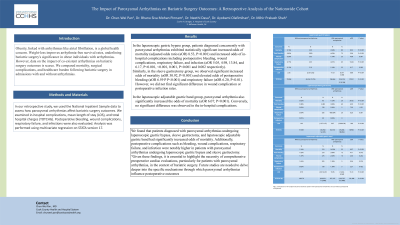Tuesday Poster Session
Category: Obesity
P4029 - Impact of Paroxysmal Arrhythmias on Bariatric Surgery Outcomes: A Retrospective Analysis of the Nationwide Cohort
Tuesday, October 24, 2023
10:30 AM - 4:00 PM PT
Location: Exhibit Hall

- CP
Chun-Wei Pan, MD
John H. Stroger, Jr. Hospital of Cook County
Chicago, IL
Presenting Author(s)
Chun-Wei Pan, MD1, Bhanu Siva Mohan Pinnam, MD1, Neethi Dasu, DO2, Ayobami Olafimihan, MD1, Mihir Prakash Shah, MD1
1John H. Stroger, Jr. Hospital of Cook County, Chicago, IL; 2Jefferson Health, New Jersey, NJ
Introduction: Obesity, linked with arrhythmias like atrial fibrillation, is a global health concern. Weight-loss improves arrhythmia-free survival rates, underlining bariatric surgery's significance in obese individuals with arrhythmias. However, data on the impact of co-existent arrhythmias on bariatric surgery outcomes is scarce. We compared mortality, surgical complications, and healthcare burden following bariatric surgery in admissions with and without arrhythmias.
Methods: In our retrospective study, we used the National Inpatient Sample data to assess how paroxysmal arrhythmias affect bariatric surgery outcomes. We examined in-hospital complications, mean length of stay (LOS), and total hospital charges (TOTCHG). Postoperative bleeding, wound complications, respiratory failure, and infections were also evaluated. Analysis was performed using multivariate regression on STATA version 17.
Results:
Discussion: Patients with paroxysmal arrhythmias undergoing bariatric surgery showed increased mortality and complication odds. These findings suggests the importance of early risk stratification in these patients. Optimization of arrhythmias might improve outcomes. Further research is needed to understand paroxysmal arrhythmias' influence on postoperative outcomes
Disclosures:
Chun-Wei Pan, MD1, Bhanu Siva Mohan Pinnam, MD1, Neethi Dasu, DO2, Ayobami Olafimihan, MD1, Mihir Prakash Shah, MD1. P4029 - Impact of Paroxysmal Arrhythmias on Bariatric Surgery Outcomes: A Retrospective Analysis of the Nationwide Cohort, ACG 2023 Annual Scientific Meeting Abstracts. Vancouver, BC, Canada: American College of Gastroenterology.
1John H. Stroger, Jr. Hospital of Cook County, Chicago, IL; 2Jefferson Health, New Jersey, NJ
Introduction: Obesity, linked with arrhythmias like atrial fibrillation, is a global health concern. Weight-loss improves arrhythmia-free survival rates, underlining bariatric surgery's significance in obese individuals with arrhythmias. However, data on the impact of co-existent arrhythmias on bariatric surgery outcomes is scarce. We compared mortality, surgical complications, and healthcare burden following bariatric surgery in admissions with and without arrhythmias.
Methods: In our retrospective study, we used the National Inpatient Sample data to assess how paroxysmal arrhythmias affect bariatric surgery outcomes. We examined in-hospital complications, mean length of stay (LOS), and total hospital charges (TOTCHG). Postoperative bleeding, wound complications, respiratory failure, and infections were also evaluated. Analysis was performed using multivariate regression on STATA version 17.
Results:
In the laparoscopic gastric bypass group, patients diagnosed concurrently with paroxysmal arrhythmias exhibited a statistically significant increase in the odds of mortality (adjusted odds ratio (aOR) 8.53, P< 0.001), and the odds of in-hospital complications including postoperative bleeding, wound complications, respiratory failure, and infection (aOR 5.05, 4.98, 13.84, and 6.17, P< 0.001, < 0.001, 0.001, P< 0.001 and 0.002 respectively).
Similarly, in the sleeve gastrectomy group, we observed a significant increase in the odds of mortality (aOR 30.92, P< 0.001), and the odds of postoperative bleeding (aOR 6.59 P P< 0.001) and respiratory failure (aOR 6.20, P< 0.01). However, we did not find a significant difference in the rates of wound complication or postoperative infection.
In the laparoscopic adjustable gastric band group, paroxysmal arrhythmia also significantly increased the odds of mortality (aOR 6.07; P< 0.001). Conversely, no significant difference was observed in the incidence of in-hospital complications.
Discussion: Patients with paroxysmal arrhythmias undergoing bariatric surgery showed increased mortality and complication odds. These findings suggests the importance of early risk stratification in these patients. Optimization of arrhythmias might improve outcomes. Further research is needed to understand paroxysmal arrhythmias' influence on postoperative outcomes
Disclosures:
Chun-Wei Pan indicated no relevant financial relationships.
Bhanu Siva Mohan Pinnam indicated no relevant financial relationships.
Neethi Dasu indicated no relevant financial relationships.
Ayobami Olafimihan indicated no relevant financial relationships.
Mihir Prakash Shah indicated no relevant financial relationships.
Chun-Wei Pan, MD1, Bhanu Siva Mohan Pinnam, MD1, Neethi Dasu, DO2, Ayobami Olafimihan, MD1, Mihir Prakash Shah, MD1. P4029 - Impact of Paroxysmal Arrhythmias on Bariatric Surgery Outcomes: A Retrospective Analysis of the Nationwide Cohort, ACG 2023 Annual Scientific Meeting Abstracts. Vancouver, BC, Canada: American College of Gastroenterology.
